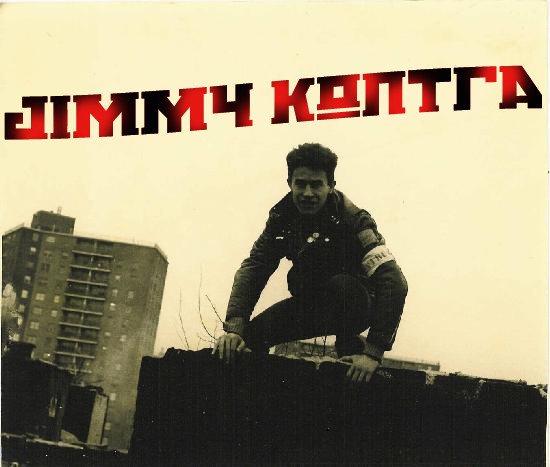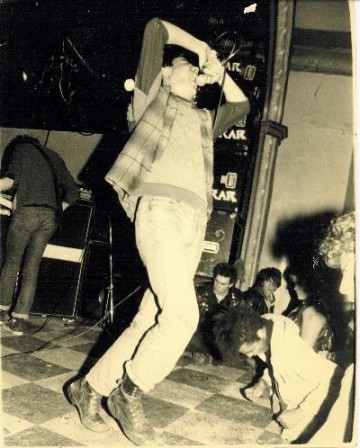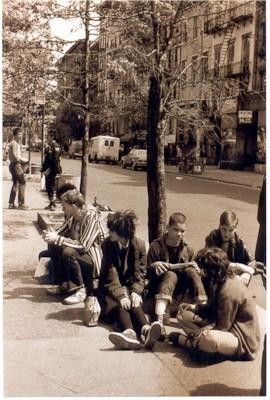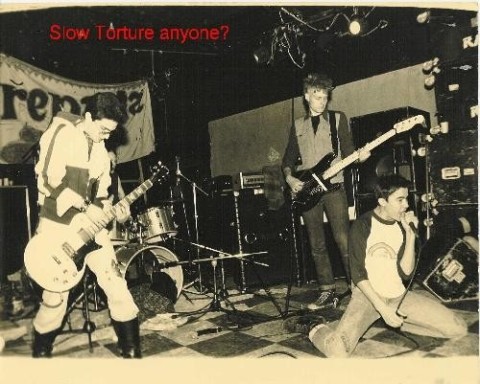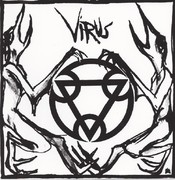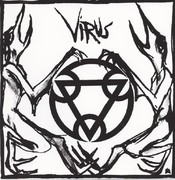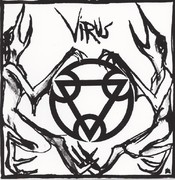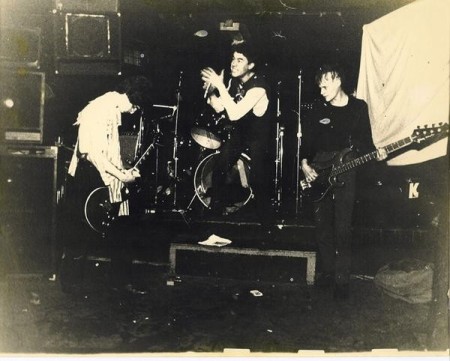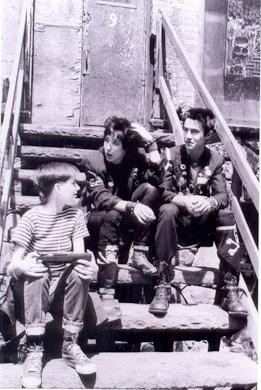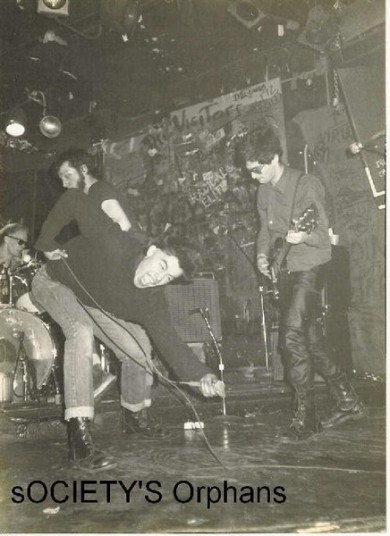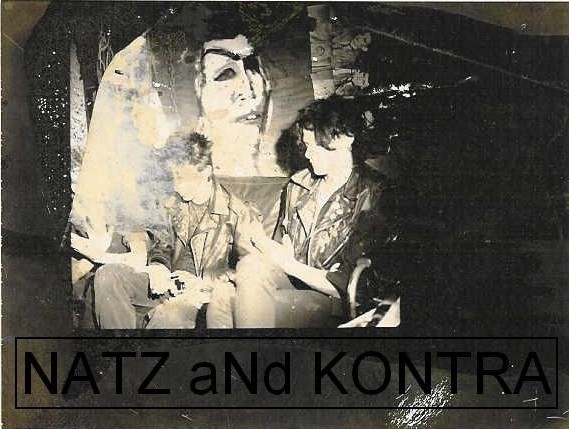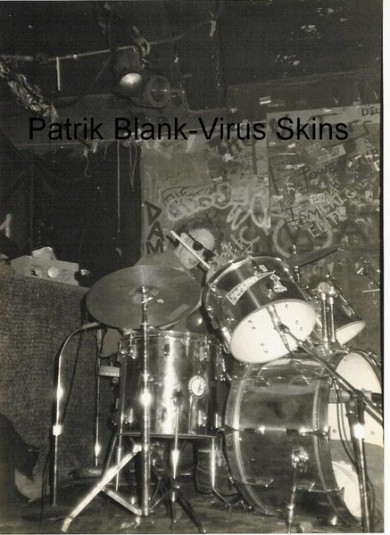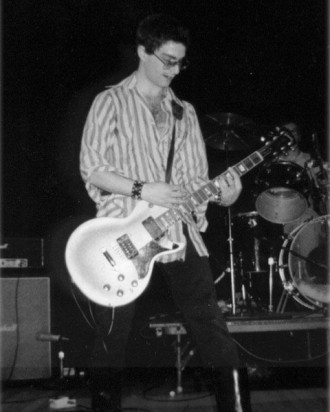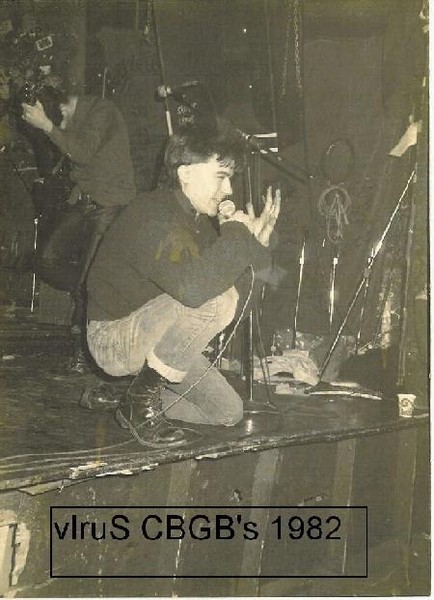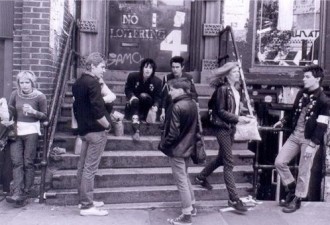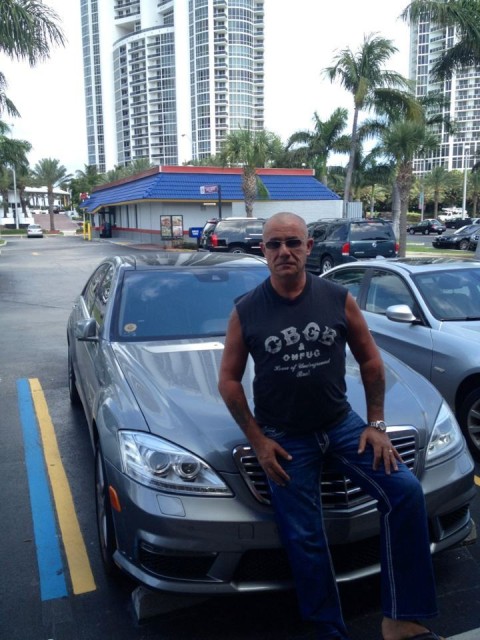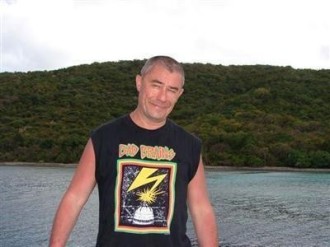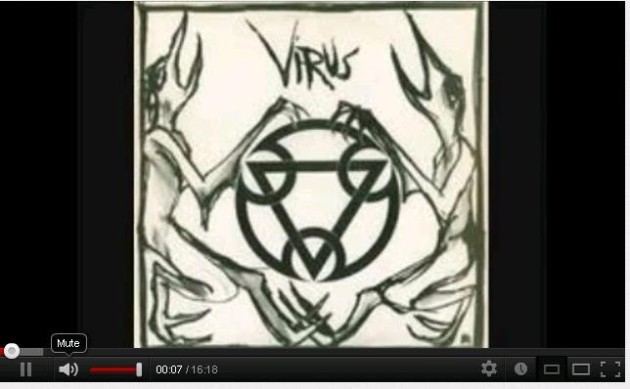Jimmy Kontra was an early singer of Agnostic Front and fronted his own band called Virus which released a record on Rat Cage Records. He discovered punk in 1977 and his life was never the same again. Old friend Scott “Scoot” Horton recently came to me with this insightful interview that he did with Jimmy back in 2008. All questions by Scoot Horton, all answers by Jimmy Kontra. Kontra logo by: Bas Spierings
Scoot: You were originally from Russia. When and how did you get to the US? Did you have to escape from Russia? What were your thoughts of the US when you were in Russia?
Jimmy: I was born in Odessa Ukraine. The Russian equivalent of Sicily in terms of criminal culture. My uncle and brother were “thieves by law”, made guys in Russian criminal underworld. My uncle was killed in a correctional labor camp by Hags and my brother also died at 18 after doing 3 years in juvie. He was released but died from leukemia in 1968 when I was 6 years old. My dad was a “black market dealer” specializing in U.S. dollars, gold and foreign consumer goods and other currencies. An offense punishable in Soviet Union by an 8 year bit of hard labor. In 1974 he got pinched and had to bribe his way out and split the country with my mom and my 12 year old self in tow. We lived in Italy for 6 months and came to NY on Halloween night of 1975. I always thought the U.S. and U.K. were great. I listened to Black Sabbath, Pink Floyd, Led Zep, and early Beatles in Russia. Albums were very expensive, like 6 months salary for each album, but my dad was very well off from his criminal activities so money for us was no problem until he got pinched. They took most of his shit but allowed us to leave the country. When we got to the states we were flat broke and moved into Coney Island projects on Mermaid Ave and 33rd St. To survive the projects and learn English I joined a gang, the Crazy Homicides. I joined when I was 12 until I stepped to NYC when I was 14.
Scoot: When and how did you get into punk? I’ve been told that you were involved in the NY Punk scene since the 70’s. What was the scene like in the late 70’s after the initial wave (Blondie/Ramones, etc) had moved on? Were there bands there to take their place?
Jimmy: I got into punk by accident. I had a friend who in 1977 was 18 and worked in one of those peep show sex places on 42nd St as a salesmen/cashier. His buddy there was a guy named, Nestor, who was into punk rock. He turned me on to the Sex Pistols. He had live tapes from the UK and we went and saw the Dead Boys at CBGB’s. I got into it frankly because I identified with the “fuck the world” attitude of punk and the cheap lifestyle. I loved the punk clothes cause it didn’t cost shit unless you were a poseur and bought “bondage” pants and punk clothing from Trash and Vaudeville. I loved the shock value of the punk look being I lived in Brooklyn and looking like that, spikey hair, lock and chain or dog collar around my neck, combat boots, ripped tees with “Chaos” spray painted on it, jeans held up by safety pins, and a bike chain which I generously used in street fights. It was not only cheap but it got me into Studio 54, Xenon, Mudd Club, and fancy clubs like that, with drink tickets yet. While rich dudes with their Ferraris could not get in, this was great. What also rocked is that older women would take me to their homes for one night stands and while they were sleeping after sex I’d often rob their pocketbooks for the cash before I split their cribs in the morning. So that’s why I got into punk in 1977. There was not that much of a scene back then, just more like personalities if you will. We would often come down to St. Marks Place and hangout on stoops drinking beer, terrorizing passing tourists for money for taking our pictures and trying to be nice to us. The bands around were the Dead Boys, New York Dolls, Ramones, and a bunch of others that played Max’s and CBGB’s. It wasn’t much about any one band or person. It was just a bunch of misfits going from gig to gig and getting drunk and high all the time. The motto of the day was “I’m a mess”, “I don’t care”, “No Future” and “Dead at 21” after Sid OD’d.
Scoot: What did you think of bands like the Nihilistics, The Mad, and the Stimulators when they first came on the scene?
Jimmy: Stims, Bad Brains, and the Mad…..The first time I saw the Stimulators was in 1980 and that is the first time a “scene” emerged around 20-30 core kids that came out to all the Stimulators gigs, most of them from NYC. Me and Micki Cunnigham, my girlfriend from high school, the only other punks from the same Coney Island, Brooklyn hood as me. You gotta understand looking and being punk in Brooklyn then was dangerous to your health. From the general population, the Italians, the police, the Russians, and all “normal” people. It was not the same as looking that way when you lived in NYC with your progressive rich parents, millionaire liberals. We had to fight our way to gigs, at school, and on trains. Just everywhere. The animosity to us was brutal, so we fought all the time, like every day. Which frankly I enjoyed back then.
Scoot: When the Bad Brains came to NY did the scene change with their presence? Did they help jump start and rejuvenate the scene? What was it like seeing the Bad Brains for the first time?
Jimmy: No, the scene did not change at all. The scene was mostly around the Stimulators and that’s where I saw the Bad Brains first. It was early winter 1980 at the TR3 gig (small club on West Broadway where Harley’s mom bartended). The Stimulators opened for the Bad Brains and did a great set. However when the Bad Brains went on, and to appreciate this you need to know the TR3 had no stage but a small dance floor so the band and the crowd were on the same level. If you put 30 people in there you had no room for a pin to drop. HR’s energy and the band behind him were truly incomparable. So by their music they did reenergize the scene as small as it was. Most of NY was still into junk rock, new wave, rockabilly, and disco. Hence we tried to differentiate ourselves by coining the term “hardcore punk”.
Scoot: Who were the early players in the scene? Not necessarily bands.
Jimmy: Again it’s hard to put it down like that. Peeps that hung out daily on St. Marks stoops around 1980 were…John Spacely (not into hardcore but from Dead Boys type scene), Natz, Harley, Bobby Steele, Crazy Joe aka Joey Nails, Jack Rabid (a hardcore DJ), DJ Mojo, Ira, Johnny Stiff, Geneva, Nick, assorted punks whose names after 30 years I simply don’t remember. Let me add that my belief to this day is this- it’s not when someone got into this movement or where they got into it or where they are from. It’s whether you are “infected by this virus” or just posing.
Scoot: What were some of the bands you were into?
Jimmy: Bad Brains, SOA, Void, Minor Threat, Stimulators, Black Flag, Circle Jerks, Crass, Poison Girls, The English Mob, 4 Skins, Cockney Rejects, Cock Sparrer, Sham 69, The Damned, 999, Dead Boys, Buzzcocks, and many, many others. I never really drew the dividing line between genres of punk and the skinhead movement. To me one did not cancel but rather complimented the other.
Scoot: Was the A7 an important part of the scene? Could you describe the place?
Jimmy: A7 was a local dive where rejects like us could play gigs and creepy crawl and generally do whatever the fuck we wanted. For a good while I and John Bloodclot got 86-ed out of there by Dave the owner, but that’s another story.
Scoot: What was NYC like back then?
Jimmy: It was very cheap and very convenient for us to live in.
Scoot: Were there a lot of street kids involved in the scene? What about drugs?
Jimmy: I think we were all street kids. I think we gravitated to the Lower East Side from different socio-economic backgrounds and family structure for one main reason. We did not fit in our respective communities, one way or another. We (Bad Brains, us their roadies, their fans) smoked weed like demons or rastas if you will while some others did dope and still others sniffed glue, those were the real fucking idiots. I used to hate fucking junkies and glue heads back then. Now 30 years later I hope to have mellowed out a bit and I feel for my peeps, for anyone caught up in any drug addiction. That is a hard road to travel and an even harder one to leave.
Scoot: Were there a lot of squats back then?
Jimmy: I only stayed in one squat for a few months on Fifth St, I, Natz, and Leesah Bohannan (my girl in those years 1981-1985) got evicted from our crib so we took over this half occupied, half abandoned building on 5th St that had heat and hot water but no electricity. We lived there for like 6 months until they finished renovating it and asked us to leave. I really don’t know much more on squat living. They were mostly hippies and burnouts that squatted. I always hustled and always had loot, so I could always pay my share of rent. Besides my Leesah made a lot of money bartending and cocktail waitressing in fancy clubs anyway so money was no problem for us. She was very beautiful and all the yuppies and lawyers gave her $100 tips with their phone numbers on them which she promptly gave me to pay for rehearsals and food at Angelica’s.
Scoot: Where there a lot of punks and skins involved in the scene and how did this change over the years?
Jimmy: At first the scene was small enough so there was not enough people in it for factions. Later on after Agnostic Front and other bands like that got established, you got “peace punks” and “skinheads” labels came into play and the scene was mostly divided. I must add that all those divisions were set aside at Virus gigs. Skinheads skanked at the stage, peace punks and intellectuals watched from the sidelines. Everybody got along at Virus gigs. Such dude could catch a mike stand to the head from me to learn some manners….bad manners. Lol
Scoot: How did your parents feel about you going to shows and hanging out?
Jimmy: To my parents, me getting into punk rock was an improvement from me gang banging at 13 years old. Carrying concealed weapons and slinging weed in the Coney Island amusement park and getting arrested from time to time. However, initially my dad thought I went nuts with this “punk rock thing” but my mom was very proud of me for letting go of gang affiliation. Not becoming a junkie like a lot of my Russian friends became in Brooklyn, but being an artist and an innovator. She always supported me emotionally. Come to think of it so did my father, in fairness to him.
Scoot: Weren’t the people involved in the scene pretty young?
Jimmy: Harley was like 10 years old when I met him as drummer for the Stimulators. There were other kids 12-14 years old. Most were like 16-20.
Scoot: You sang for Agnostic Front. How did you join the band? Where you their first singer? How long were you in the band?
Jimmy: I was asked to join the early version of Agnostic Front by Vinnie and Raybeez at a Minor Threat gig at CBGB’s. The first singer of “Zoo Crew” aka Agnostic Front was a kid on the scene named John Watson. He left and Vinnie asked me to join. Ask Vinnie, maybe he remembers. I was in the band for a short while until I decided with Natz and Patrick Blank to start a band called the Heretics which later became Virus. I think Roger came from somewhere and joined Agnostic Front then.
Scoot: Did you have a band before Agnostic Front?
Jimmy: I was in Crypt Crashers with Robbie on drums who later joined Cause For Alarm. That was my tight click ideologically, Robbie, Dan the Anarchist and his wife Nancy, Natz, and a few others not in bands.
Scoot: On you’re MySpace page it says you guys were disgruntled with the hardcore scene. Why was this?
Jimmy: Too many fucking poseurs and ego maniacs, and the term itself is ridiculous and fake. NYHC, please….the term was “hardcore punk”. Who made up NYHC, I don’t know but it’s a bullshit term.
Scoot: Why did you change the name from the Heretics?
Jimmy: I feel what punk rock is, true punk rock is a virus, a social infection that some people get, God knows why. That’s why we called the band Virus, to infect others with punk rock.
Scoot: Did you guys play a lot of shows?
Jimmy: Not too many, but the ones we did play were sick and remembered. We hardly made or put up flyers. Too lazy so our gigs were mostly word of mouth.
Scoot: How did you hook up with Ratcage Records? Was Jerry Williams (171A) in Virus at all?
Jimmy: I was good friends with Dave Parsons and Cathy from before Dave opened the Rat Cage skateboard and record shop. They were a big part of the Stimulators scene, so it was natural that Dave put out our little record. He did all the bands at that time, Beastie Boys, Young and Useless, etc. Jerry Williams was our engineer with Scott Jarvis on the Virus record and at some gigs of ours. Jerry was an integral part of the scene and made a lot of this music possible. From Bad Brains to Virus with his space 171A and his time at the sound board at gigs and studios. Without Jerry, Scott Jarvis, and Dave Parsons there would be a lot less albums and bands from those days.
Scoot: Could you say something about Natz, Blank, and Jimi Human?
Jimmy: What is there to say? Natz is one of the most talented musicians and poets I ever had the privilege of knowing. He was my best friend and closest to me ideologically. We were very tight for a number of years before and during Virus. Then I just had a few too many crazy episodes that may have proved too much even for my best friend to deal with anymore. I take full blame for the Virus break up. Sometimes even punk has limits of acceptable behavior which I crossed numerously. I mean here’s one example….Virus gets a well paid gig at the Pyramid on a Saturday night, Jimmy G and Raybeez hooked it up for us, and what do I do? On Friday before the gig I go to the Pyramid, get drunk and start fighting with bikers and civilians and get 86ed and the next night Virus is on stage and I’m singing on a cordless mic outside the club on the sidewalk of Avenue A. Patrick Blank (RIP) was a bit older than Natz and me, much more level headed, highly intelligent, well read and well-spoken man. I could not say enough good things about Patrick, may God rest his soul. It’s always the good people that God calls back early….RIP Pat, I will always love and miss you. Jimi Human, that story is a real tragedy, and again I blame myself for maybe contributing to that outcome for Jimi. As Heretics we could not find a guitar player that we wanted to ask to join the band. We even did a first gig as Heretics at CBGB’s without a guitar player. On stage just Natz on bass, Pat on drums, and me screaming. Jimi came to our attention as a talented and ideological musician. We got lucky that his band, No Thanks, was on hiatus and we asked him to join Virus and he did. Jimi wrote a few of the newer songs that we did not get a chance to put on vinyl. Tracks like “Slumlord”, “Drunk With Power”, and a few others. A foot note…If anybody can point me or Donna Damage of No Thanks to his current whereabouts will receive a monetary reward from me. Jimi has friends and will be cared and provided for, always.
Scoot: I’ve heard that the scene changed/split in 1983/84.
Jimmy: As I said, the scene prior to 1980-81 was much smaller, not enough people for factions. As more people came around that meant more factions and more sub labels followed. Some people took bits and pieces off national front UK skins ideology and some red neck racist bullshit and made a stupid smorgasbord of these faulty ideologies. Peace punks were mostly a fashion look and hippie ideology, just passive lethargic victims. I still can’t stand hippies, but whatever, “if it harms no one do as you will.”
Scoot: Was the NYU radio show an important part of the scene? (Tim Sommers and Jack Rabid)
Jimmy: I don’t know if it made the scene or not but definitely Jack and Tim made it possible for a lot of new people to hear and feel real punk rock. They probably infected a lot of kids with the punk rock virus and were responsible for bands forming in a lot of places like NJ, CT, and PA that would not exist if they did not hear Jack and Tim’s show. Big up to them.
Scoot: When and why did you stop going to shows?
Jimmy: I don’t know if I stopped for any particular reason other than this. I think that for me, being where I came from, the scene just got too commercial, too pacified, too main stream rock and roll with bands trying to “sell merchandise”, tickets to gigs and their records. And side benefits to these would be “rock stars” were girl groupies, ass kissing for “legends of hardcore” on their pages on My Space and that kind of bullshit. If that’s the “scene” then “punk is dead” so what do I need to see out there?
Scoot: How do you think the scene changed from when you first got involved to when you left? Was it a positive change?
Jimmy: Any movement that encourages people to question authority, not turn a blind eye or other cheek, be true to themselves and others, live by a code of honor, conduct of self-worth and self-accountability, and to me that’s what punk/skinhead movement is really about. And as such movement gets bigger over time, no matter what growing pains it experiences along the way, can only be a positive change from the early days of NY hardcore punk scene to later NYHC scene.
Scoot: When did slam dancing come into the picture?
Jimmy: Slamming, to me, was a natural evolution to “Pogo”. Punks jumping up and down mostly in the same spot on the dance floor. To me, I got to credit slamming in NY to the speed and energy of the Bad Brains sets. You just couldn’t help it but thrash all over the place and slam into others. Also the Stimulators sound was similar in energy level, Harley and Denise worked very well together and had the crowds moving from second one of their sets. Stage diving started in NY really at Irving Plaza around 1979-80, at Bad Brains gigs. Harley Flanagan, John Bloodclot, Robbie Cryptcrasher, Danny Anarchist, me and a few others would get up on stage, start up with stage bouncers (mostly big bikers in those days) and when the bouncers were about to grab you and throw you off, if you were lucky, or fuck you up, which was more probable then just getting thrown off the stage, you’d dive off the stage into the audience. So it was sort of a game of “chicken” with stage security. I think we had real practical reasons to dive off the stage.
Scoot: Why do you think that when the first wave of hardcore bands died out in DC and Boston their scenes also died out but NYC’s didn’t experience this and the scene seemed to prosper?
Jimmy: I don’t know if DC and Boston scenes “died out” and NYC’s prospered- I am not a “hardcore historian”. I do believe that there are everywhere globally who are to this day able to see thru the bullshit of society’s trappings and are living their lives without compromise and not governed by media brainwash. Some of them still jump on stage and scream about it accompanied by this pure high energy music you call “hardcore punk rock”.
And just before going to post this Scoot got back in touch with Jimmy Kontra to get an update sorta speak to see what he is up to these days…
By the end of 1985 Virus broke up after the first show we did in Montreal on our first tour to support our “Dark Ages: EP issued a year prior. Upon return to NYC I found myself homeless as my girlfriend threw me out of her apartment in East Village. I moved back home to my parents apartment in Brooklyn. I still spent most of my time in NYC spending days working at Enchantments, a Wiccan Store on E. 9-Th Street and 2nd Avenue and nights hanging out in local bars going to shows and trying to reassess my life at that point. Natz our bass player told me he is fine with me continuing the band without him. I felt that without the original members it was a mute point as I wasn’t interested in having a stand in play the songs he wrote on his bass and act like it’s the same band. I was asked to join a speed metal band as a lead but after a while rehearsing decided that wasn’t for me. I got a break in my life by end of 1986 as some kid from Brooklyn, whom I ran into by sheer luck one night, told me about his friend making really good money selling penny stocks on Wall Street.
I checked it out and realized it’s the most “real punk rock “thing there was to do in the world. I could call wealthy people all over America cold calling them over the phone and high pressure sell them high risk stocks while getting sometimes 50% of their money as commissions. I applied myself to this field as I was a natural hustler from my life on L.E.S. and selling weed in Brooklyn when I was a kid for my gang. I actually consulted on a film called “Boiler Room” because the role that Ben Affleck played in the film was inspired by me in real life.
I trained new hires at J.T. Moran and Co. the penny stock brokerage on which this film was based. By 1994 I elevated to putting my own deals together as a small cap stocks promoter. In 1994 I also met my future wife, we got married in 1996 and had a son in 1997. Around that time a few of the dot com companies I promoted worked out in the market became profitable and their shares very valuable and liquid, I became independently wealthy on that. Once my son was born I retired for 5 years to focus on raising him as my wife went on to receive her MBA and pursued her career. In 2002 my wife and I started a commodities/precious metals brokerage firm and still run this firm 10 years later. The company has 4 offices and 60 sales people/brokers working there. We are very comfortable living on the ocean in South Florida and are watching our son become quite a young man. Alec is an accomplished chess player and MMA fighter with over 80 trophies adorning his bedroom for both MMA (Muay Thai, BJJ, Burmese boxing and grappling) and chess. Alec “The Grizzly” Weisbrot has over a million views on his You Tube channel for his fight videos from age of 8 to the present. That’s my story so far…stay tuned because it will only get better from here. PMA!!! James Kontra July 18, 2012.






